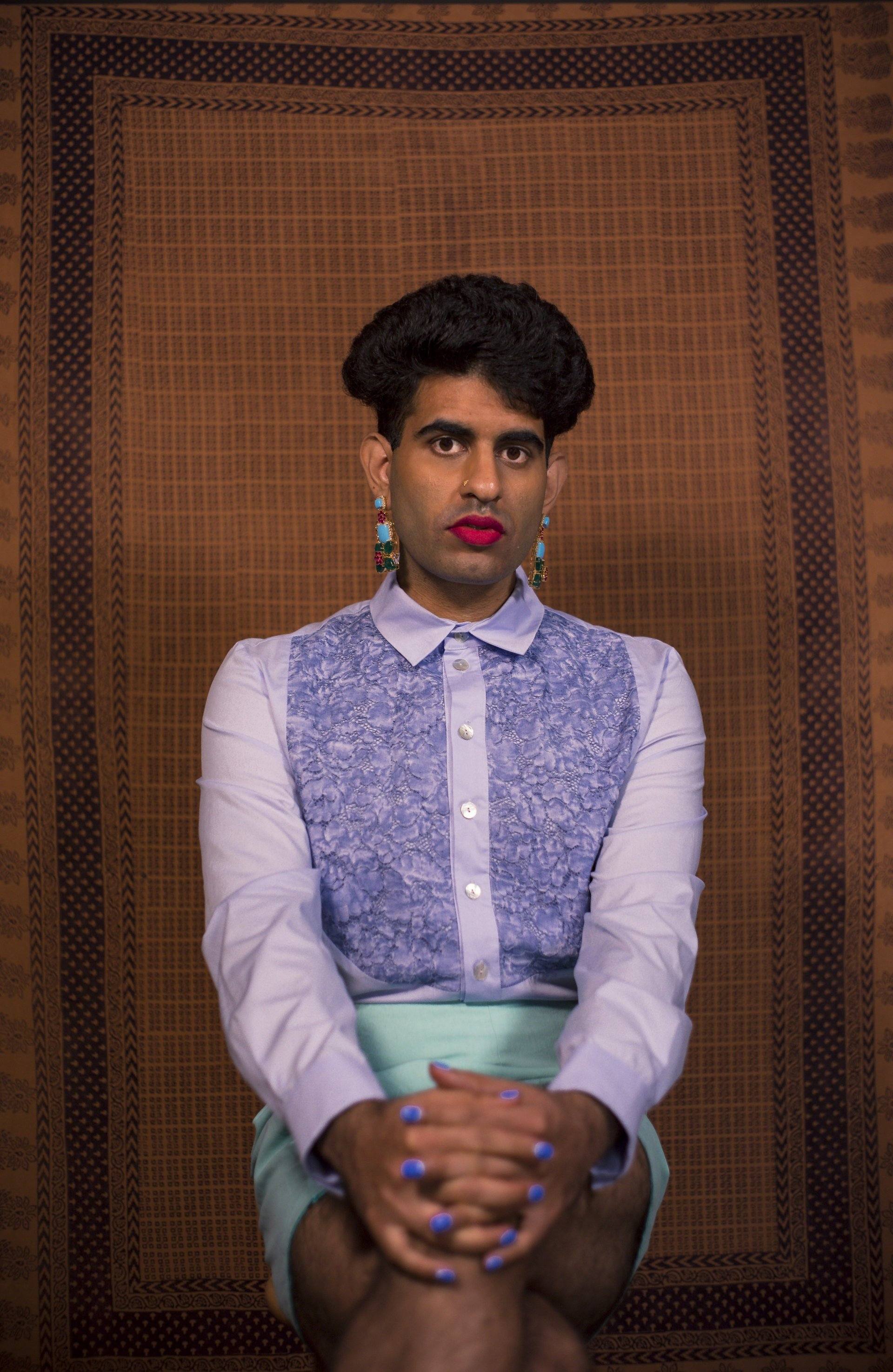ALOK
Im Zeitraum vom Januar bis April 2021 fand mit ALOK die erste längerfristig angelegte Web Residency bei uns statt. Alok Vaid-Menon ist interdisziplinär arbeitende*r Künstler*in aus New York/Los Angeles und hat im Rahmen seiner Web Residency die zwölf Werke umfassende Arbeit CAPTIONS gezeigt. Im Fokus dieser ursprünglich via Instagram veröffentlichten Arbeiten stehen Porträtfotos der Künstler*in mit dazugehörigen Bildunterschriften - in Englisch ‚captions‘. In diesen unregelmäßig über den Zeitraum veröffentlichten und über die Social-Media-Kanäle des Center for Literature gespiegelten Bilder mit Textbeiträgen beschäftigt sich ALOK mit den Themen Künstler*innen-Identität, Gender, Race, Zugehörigkeit und dem Kunstbetrieb.
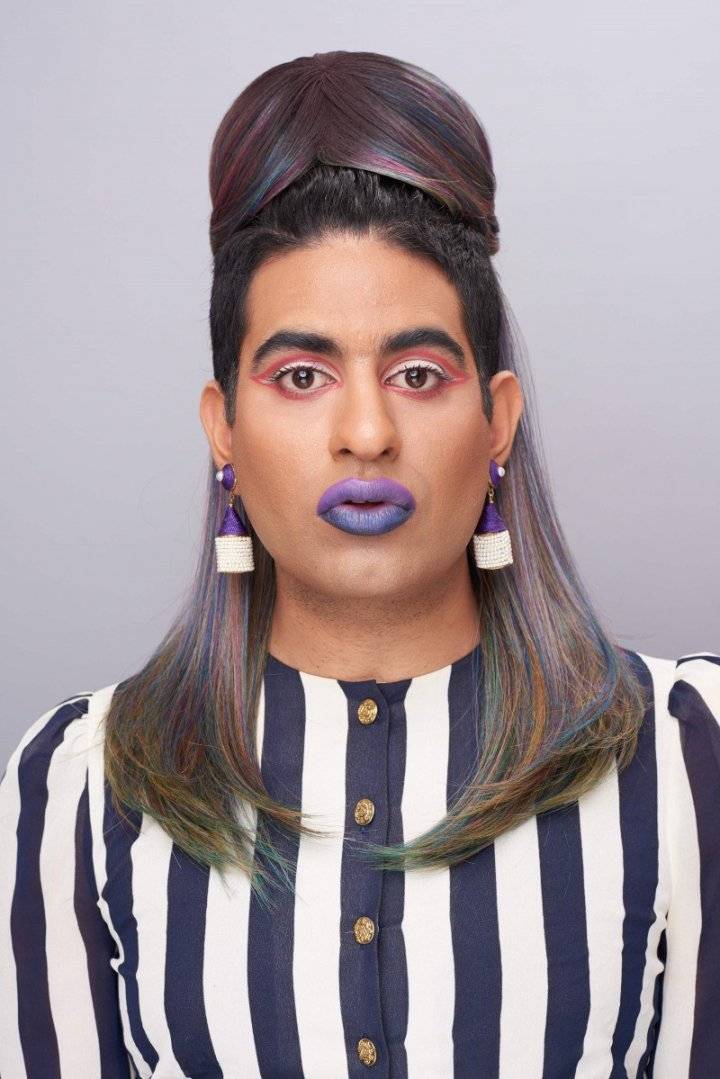
1
1) there are far more worthy pursuits than being liked. like being. 2) not all knots need to be untied. you are not for everyone, you are for you. how devastating. how gorgeous. 3) their fear is not your own. emancipate yourself from their shame. protect your beauty. 4) authenticity is an orientation, not a destination. live many lives. each one as true as the last. 5) redefine failure as stagnancy, not sinking. perhaps the treasure you were seeking was waiting there all along. beneath your capsized ego. 6) perfection is a eugenic ideal. love people for who they are, not what you think they should be.
7) no one is coming to rescue you. this is not a tragedy, it’s an opportunity. become the person you were waiting for. 8) feeling is dangerous. but what do you call disassociation? better to know the origin of a bruise than not. 9) there are words & worlds that don’t exist yet. make them up. few things are more real than fiction. 10) design murals for all the miracles. paint them in every conversation. make hope contagious. 11) once upon a time someone felt your loneliness. find ancestors. become their living memorial.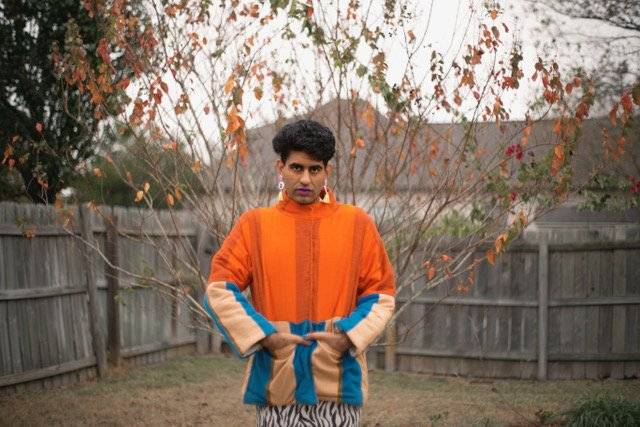
2
Fran Lebowitz dubbed her decades-long writer’s block a “writer’s blockade.” Her editor blames it on her excessive reverence for the written word. I’ve had a book in mind for years. In my case I think the malady is a mistrust of the written word. Part of the devastation of heartbreak is the word itself. “I’m heartbroken.” How anticlimactic. I live in that discrepancy: the space between screaming and the word ‘scream.’
That’s why I first became magnetized to the stage. Performance is three-dimensional language. Words are fireworks. Live art reveals everything else to be dead, no? Once Taylor Mac delivered a continuous 24-hour performance. Taylor Mac made the work and the work made Taylor Mac. The critics can write about fatigue, but a yawn makes the body more real. Performance makes life real.
Sometimes I blamed the algorithm. Sometimes I said I was too busy living to write about it. Sometimes I worried that my prose wouldn’t glisten as much as my ideas. Most of the time I feared failure. I speak several tongues, but I tend to be most proficient in excuse.
It took a global pandemic to get me to finally slow down and stop touring. I haven’t been on stage in a year. Despite remaining stationary, my imagination has been running wild. No, because of it. From one view constraint prohibits. From another, it incites.
Where does a performer go when the theaters are closed? I built a stage right here at my desk. The study is both a place and a practice. I grabbed the closest book, and haven’t stopped since. For Baldwin. For Sontag. I became an audience of one. And I swear sometimes it feels like this book, it was meant for me. Like these people, they left evidence of themselves, for me. An open letter to the ocean.
What if writing is performance? What if books, then, are mobile theaters? Under covers, on the bus, in the waiting room – making art, live. What if we write for the people who do not exist yet? What if we write, so that they can exist? Perhaps it’s less about the method, more about the meaning. Don’t focus on the words. Write as if you were laughing. Or weeping. Write as if you needed to convince yourself that you were, in fact, alive.
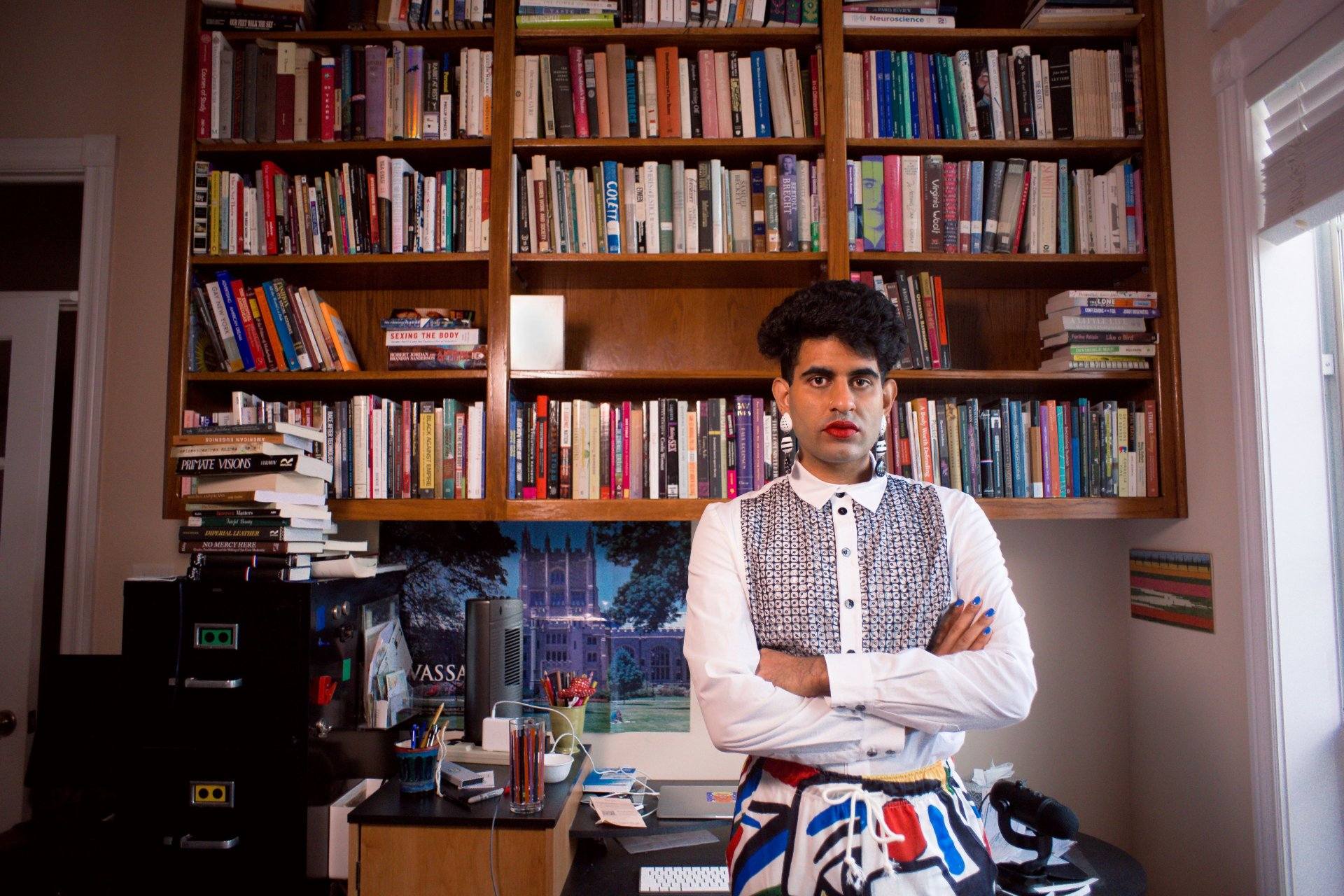
3
We live impossible lives. Miracles are not exceptional; they are everywhere. In order for me to be here writing this to you now, for you to be there reading it, a billion things had to go right and a billion things wrong. This was not supposed to happen. And it is. We are not supposed to happen. And we do. If that’s not a testament to the gruesome charm of being alive and meaning it, I’m not sure what is.
Impossible is enlisted as a foot soldier for the status quo. Its purpose is to re-inscribe the political coordinates of existence, stifle any attempt to stray anywhere else. When they say: “That’s impossible!” They mean: “Don’t imagine otherwise!” And when you do just that, they will dismiss you as naïve and idealistic. So what?
Reality is a construction project with no completion date in sight. Of course a camera cannot capture itself. Of course a telescope cannot see what it doesn’t. Of course they will delegitimize any viable alternative. But are we trying to be legitimate, or are we trying to live?
Have bad manners: daydream anyways.
Lurking beneath every crisis is another: parched imagination. Poet Amanda Gorman calls the country simply unfinished, not broken. What if this world was just one draft? What if everything could be rewritten? The job of an artist is to replenish imagination. Is to say: there are ideas we haven’t considered yet. Feelings we haven’t encountered yet. Love we haven’t surrendered to yet. ‘Yet’ is the most wonderful word ever built. Let’s live there together. Redesign existence.
As a child it wasn’t safe for me to express myself outside. So I stayed inside. I went treasure hunting in the library. Novels became my instruction manuals. History, my family. Sometimes I’d stay up all night watching NOVA documentaries about space. What a delight to discover that I was insignificant. What a relief to learn so early that beauty comes from the things we will never know, not the things we do.
I’m not sure what the future holds, but I know what I do. A book. A phone. A conviction: impossible is invitation to imagine something else.
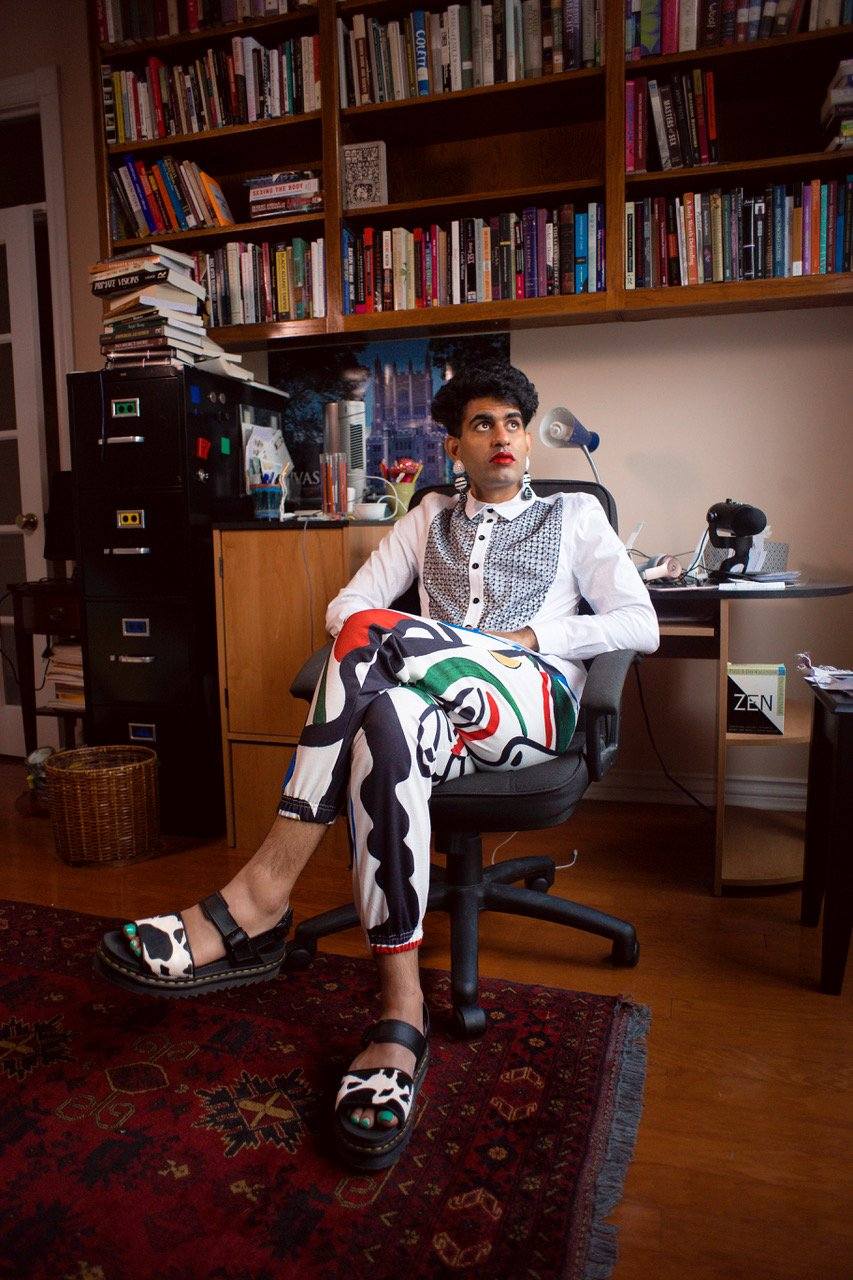
4
I suffer from various forms of chronic pain. Whether prepositions alleviate or compound the suffering has yet to be determined. “From” makes the pain external to me. “With” makes it feel like we are in this together. Are we? Is this, me? Pain unsettles grammar. It can’t be spoken or written, just felt. Where does the body begin and where does it end? I don’t know, but I hurt.
Staying above, no below, no inside chronic pain means I have to spend so much time flitting through doctors’ offices. My tests and charts and x-rays reveal nothing but a refusal to accept that just because things seem invisible doesn’t mean they aren’t there.
Sometimes it feels like “doctor #” is the only unit of measurement I have. Doctor 1 gifted me conviction, then misplaced it. Doctor 7 made me curious, then deeply afraid. Doctor 9 introduced me to another specialist who introduced me to another specialist who introduced me to another. How else to describe it but a perverse courtship with all the heartbreak it entails? Losing hope is a side effect they fail to mention. Every time it’s like rediscovering the pain for the first time. Each time more devastating than the last.
The aesthetics of doctors’ offices are so ungenerous and sterile. I suppose when you view the body as a machine, collapse the complexity of the human body to categories, it’s only fitting that the office feel so mass produced and fungible.
So, I dress up. I wear the most rambunctious colors. I may not be able to control my pain, but I can tie a tie, lace a shoe, clash a print. I sneak selfies in waiting rooms, dressing rooms, like I’m trying to save a piece of myself from the x-rays. Making evidence. There was melancholy, but there was magnificence outside/within/during it. We excavated beauty from the lugubriousness. Carved it out of the marrow of this unruly earth.
I hesitate to metaphorize pain, but permit me this one indulgence. Isn’t this what life is? A barren embrace. A relentless drone. But sometimes – despite everything – rapture. Heaven on earth: we build it.
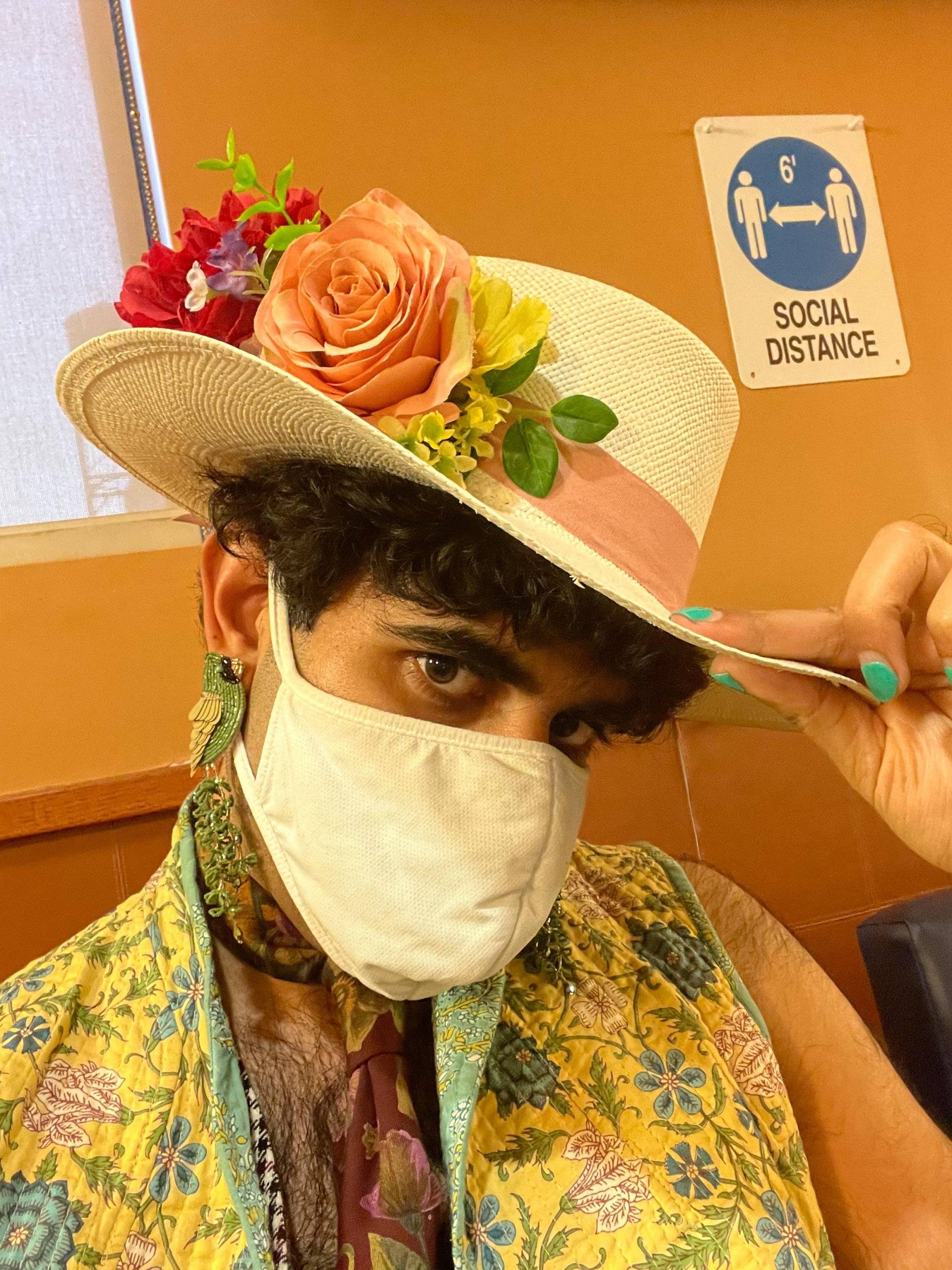
5
People often ask me what it was like to grow up in small town Texas. Truthfully, I don’t remember.
When I look at childhood photos it’s like I’m looking at someone else. The only evidence that I have that I was real is other people’s stories. I scour through every stray diary entry like an archaeologist trying to find myself there. But no amount of home videos, yearbooks, newspaper clippings bring me back to life.
I spend a lot of time thinking about what it means to be alive. In the mechanical sense yes my lungs, they were breathing. My heart, it was beating. But it’s up for debate if I was living.
I can’t tell when it happened but at some point I began to vanish. It’s like I was watching my life from the sky as an omniscient narrator. It wasn’t “I am hurting” it was “look, they hurt this person.” Nothing that happened to me happened to “me.” I became the apostrophes themselves, floating above, always at a distance. I learned how to exist in two places at once. From the age of five I planned my escape. Time travel was a Thursday afternoon. Because the present didn’t belong to me, I lived in the future.
Disassociation both saved my life and made me lose it. What a strange sensation: the grief of being alive to mourn your own death.
My Saturn return lassoed me back to my home town last year. It was the longest I had been back since I was a child. Morning after morning I would wake up and look at the same ceiling. Sometimes I would take long walks hoping that it would all come back to me. That I would come back to me. A sudden flash, like in the movies.
It never came. But I can tell you what did: I didn’t find me, I forgave me.
In one story we disassociate because we’re broken. In another, we do precisely because we want to heal. My body fought for me before I could. It innovated and insulated me: creating the space for me to daydream myself into existence. I can’t pinpoint when it happened, but I began to plant gratitude everywhere in myself I felt shame. Filled lack with love. I may not know what I lost, but I am here to feel it. For the first time I (not “I”) experience this pain.
Thank God my beautiful child – they gifted me the ability to feel.
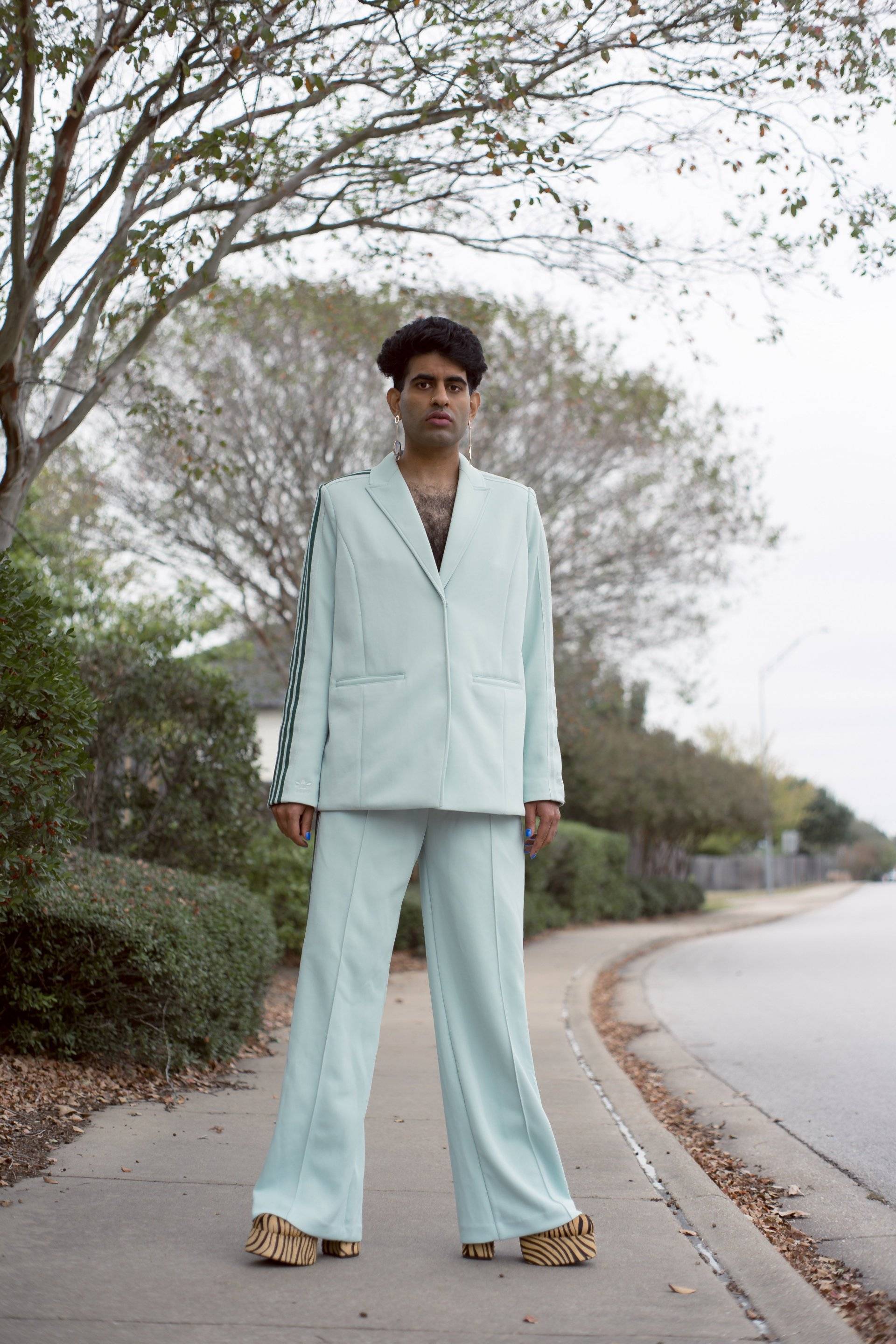
6
A definition for art: being alive (and meaning it). An artist is someone committed to living, not merely existing. Life is the canvass is the comedy club. The poem doesn’t end with the stanza, it follows you home like a shadow. The song, it sticks to you like stubborn wrist band. Sign me up for that endurance performance piece.
I want to live where meaning does. Which means I’m always chasing something. It’s difficult for me to say: “This is who I am,” because in the time it took me to construct that parlor for you, I already fled somewhere else. A flame not only flickers, it winks.
Which means everything we make will always only approximates what we are. Which means even though we both met the same person, we met different people. It’s the best and worst case of “you had to have been there.” A pressed flower in a book isn’t so different from the page that smothers it. Both require a cut.
Q: “Best mailing address?” A: “I don’t know.”
Q: “What do you mean?” A: “I mean, therefore, I don’t know.”Address it to the closest train! Address it to the clouds! I’m not sure I’ll be home when it arrives. Or rather, I’m not sure where home will be when it arrives. I’m not sure I’ll be when it arrives. Or maybe, I’m not sure home is anything more than the ideas I have in the moment. I guess that’s why it’s so arduous, writing. I want to protect the moment from the injury of history, from the cruelty of time itself.
When people say “so-and-so is the moment.” How precious. To be permitted residency in the here-and-now. Allowed to live in that very second’s millisecond. No prospectus for the future, no nostalgia for the past. To just be there so fully that it makes it here. The eternal ephemera of being alive (and meaning it).
Artists live so ardently they make “there” “here” and “then” “now.” They know home less as a destination, more an escape plan. They make things to be destroyed. And in that destruction, they create. Every moment: a million deaths. A million births.
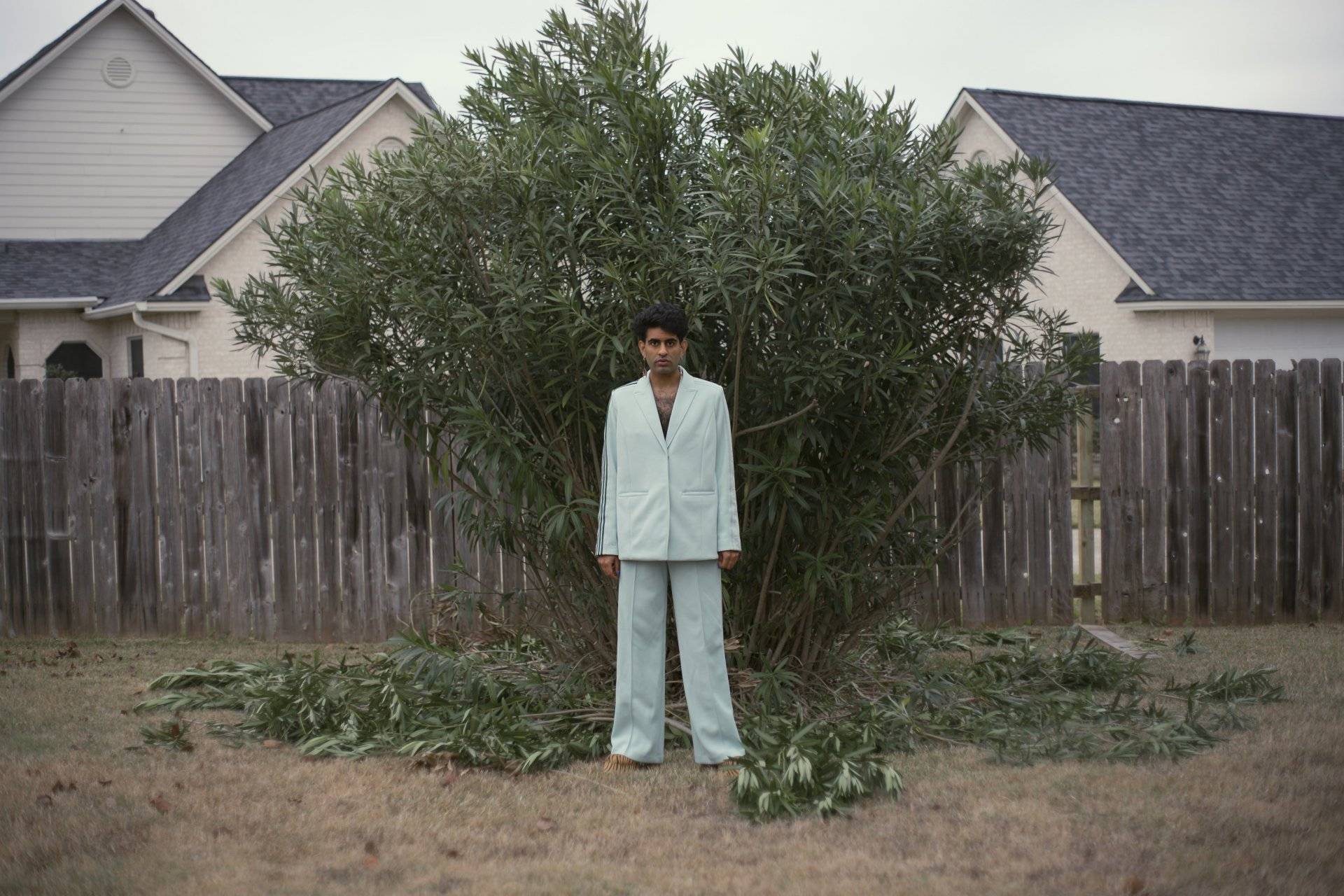
7
Everything is made of something, even silence. Dust is composed of sloughed-off skin cells, hair, clothing fibers, bacteria, bits of dead bugs. Air is nitrogen, oxygen, carbon dioxide, neon, hydrogen. Me? I’m an ensemble of organs. I’m all the packages no one claimed at the post office. I’m the words you make when you can’t remember the lyrics. Garbled, but oh so sincere.
One year into the pandemic I find myself finding myself. There are, it seems, things that I never allowed myself to feel. They are so present with me now such that “isolation,” feels like a misnomer. I’m in dialogue with my past selves. We order take out. We stay up all night telling secrets. We make promises we won’t keep.
Grief has no expiration date. Like bad breath, it lingers. That is, until you listen to the smell of it.
Think of it this way: every word that we speak, every move that we make eventually becomes dust somewhere. If you want to know how people live, spend some quality time hanging out with their trash. The negation of a thing is still a thing. The discarded do not die, they go somewhere else.
Once upon a time I did not cry. No matter what the calendars say: that is an event. A reverse sound, otherwise known as silence. I’m hunting for it, still.
The task becomes: what nook, what alcove, what muscle do we go to discover the aftermath of the things we could not say, but felt? Where do we go to find the feelings that could not be so elegantly carved into words? That which had to be sacrificed to make sense.
Poets have many jobs. Today we’ll call them: archeologists of silence. We use tongues like fishing hooks. In reverse. We carbon date the loneliness. Convene with the detritus. We fling ourselves into ourselves. Over and over again. Dig deeper than a stethoscope.
This pain, even it is made of something. I’m just trying to figure out what.
What happened to me. What happened to make me.
What lives in death.
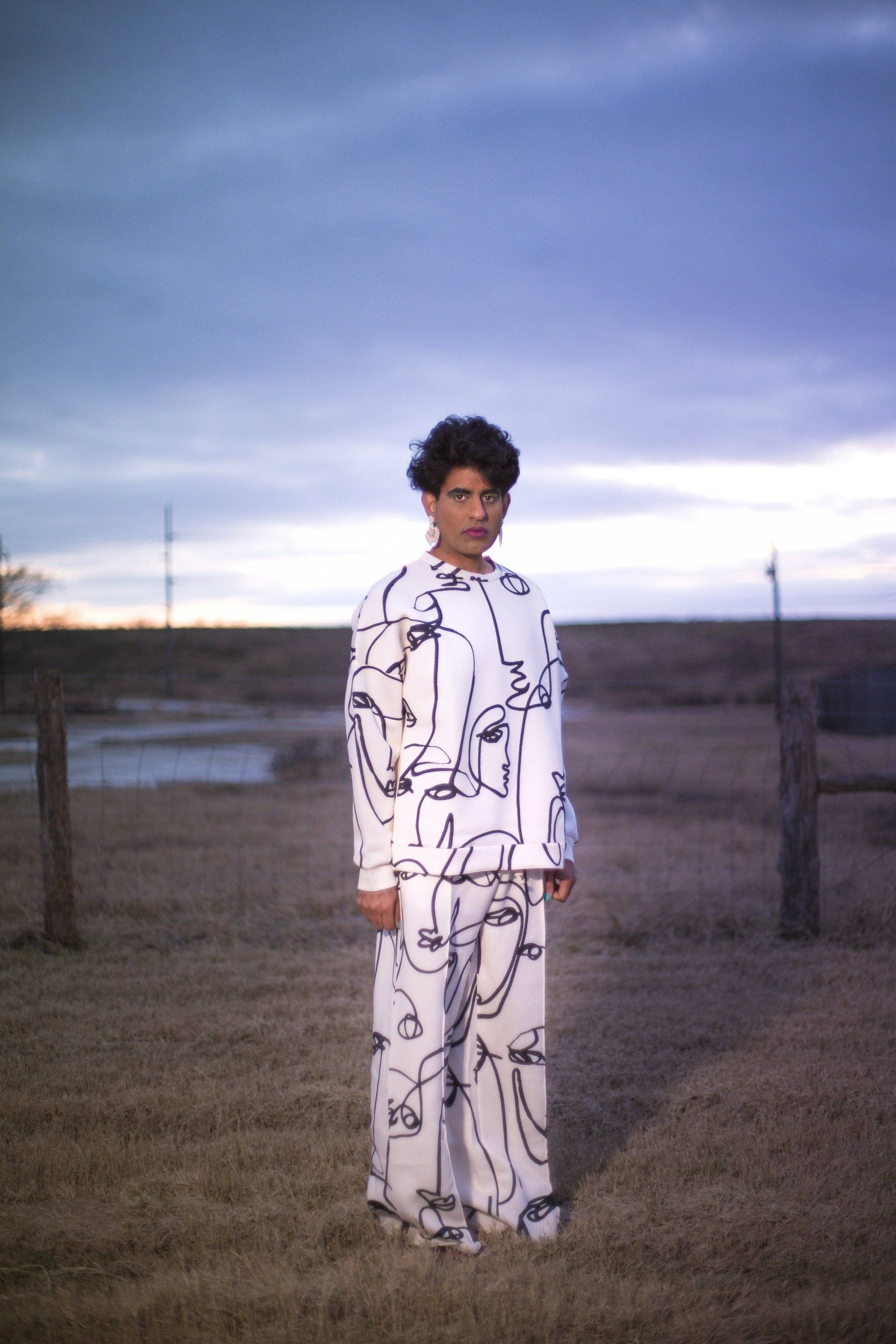
8
My first word was irony. Growing up a boy, they called me too feminine. When I finally claimed femininity as my own, they called me a man. These are grammar lessons: some of us are only allowed to be thought, never to think.
When they insist that our pronouns violate grammar to some degree they are right. Grammar is less about the mechanics of language, more the monopoly of it. It’s not just about who can speak, but who gets to speak. He who controls the word controls the world.
What they mean is: don’t object to remaining object. You are not a subject (unless you subject yourself to me).
In school we were taught that basic sentence structure includes a subject and a predicate. How naïve I was to believe that if you just found the right words and put them in the appropriate order it would necessarily lead to understanding. How devastating: meaning is not an equal opportunity employer.
I studied so hard. I choreographed my tongue to carve the inchoate sounds of my soul into language. What a tragedy to learn on the other side: it doesn’t matter if you have all the right words when they think you have the wrong body.
Subject. Predicate. Power. In order to be understood, you must have power. What this means is that we could both launch the same words and they would still land in different places. What this means is that so often their words are prioritized more than our lives. What this means is that in order to understand us you must…wait. I don’t think I can express that here. Meet me somewhere else.
The body is three-dimensional language. Beauty is the harshest editor. I could spend the rest of my life articulating every detail, every grain, every follicle. And still they would not understand. Because of what I look like. No: because of what they feel about what I look like.
A grammar lesson: if you were to scream in outer space no one would hear you. Sound waves can’t travel through an empty vacuum. Only you would be able to hear yourself because the sound waves would still travel through your body.
This is what it feels like to be brown, trans, femme, and alive.
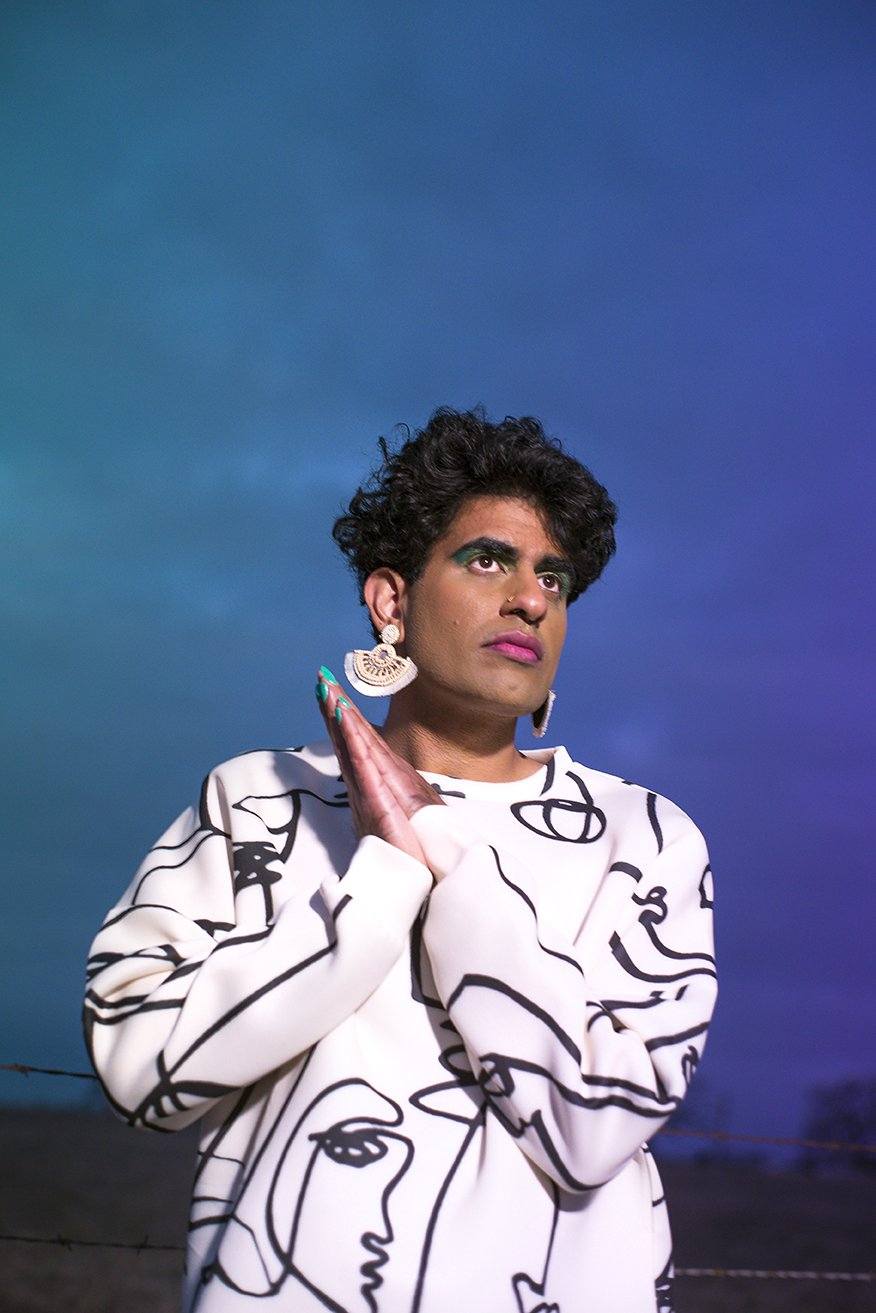
9
Anatomy Lesson
In fifth grade we learned about the different systems of the body. They gave us illustrations of anatomy we took home and memorized like maps. I’d take my finger and trace food through the digestive system. I’d trace breath through the respiratory system. Blood through the cardiovascular Once, I tried to find where the sadness went. (It was too hard.)
Hard. Being alive is…hard. What I like about that word is that it concedes the materiality of feeling. Admits that sadness can accrue, over time, like plaque on a tooth. In a world that continually stages the distinction between what is real and what is not, hardness is a concession that just because something happens “in our head” doesn’t mean it stops there.
How we feel, matters. Meaning: it creates matter. It assumes form. Pain has the potential to change the very physicality of the brain. Culture, society, discourse, language, tradition. They are physical processes. Biological, even.
Etymology is not the full story. It’s not just where words come from, it’s where they end up. The end of a sentence requires punctuation for coherence. I say: for contrivance. It gives the false impression that the meaning ends there, on the page. But if you look deeper. They keep going. Our bodies are the evidence.
Maybe pain is one of the places where language becomes physical.
The integumentary system, the musculoskeletal, the lymphatic, the endocrine. If I could go back I’d include more to the list: The economic system. The racial. The gender. Say: this world is made up of organ systems that manage all the essential body functions. They determine what lives, what dies. Show the transcripts from legislative sessions, the comment sections, the dinner tables. Say: these are anatomy lessons. They determine who lives, who dies.
One day – when I die, rewind the heart attack. What power precipitated it? Unfurl the tumor. What policy prescribed it? Dissect the culture, not just my corpse. Diagnose the world. Hold one big stethoscope to its heart. Listen. Is it breathing or is it weeping?
An anatomy lesson: there are no casualties.
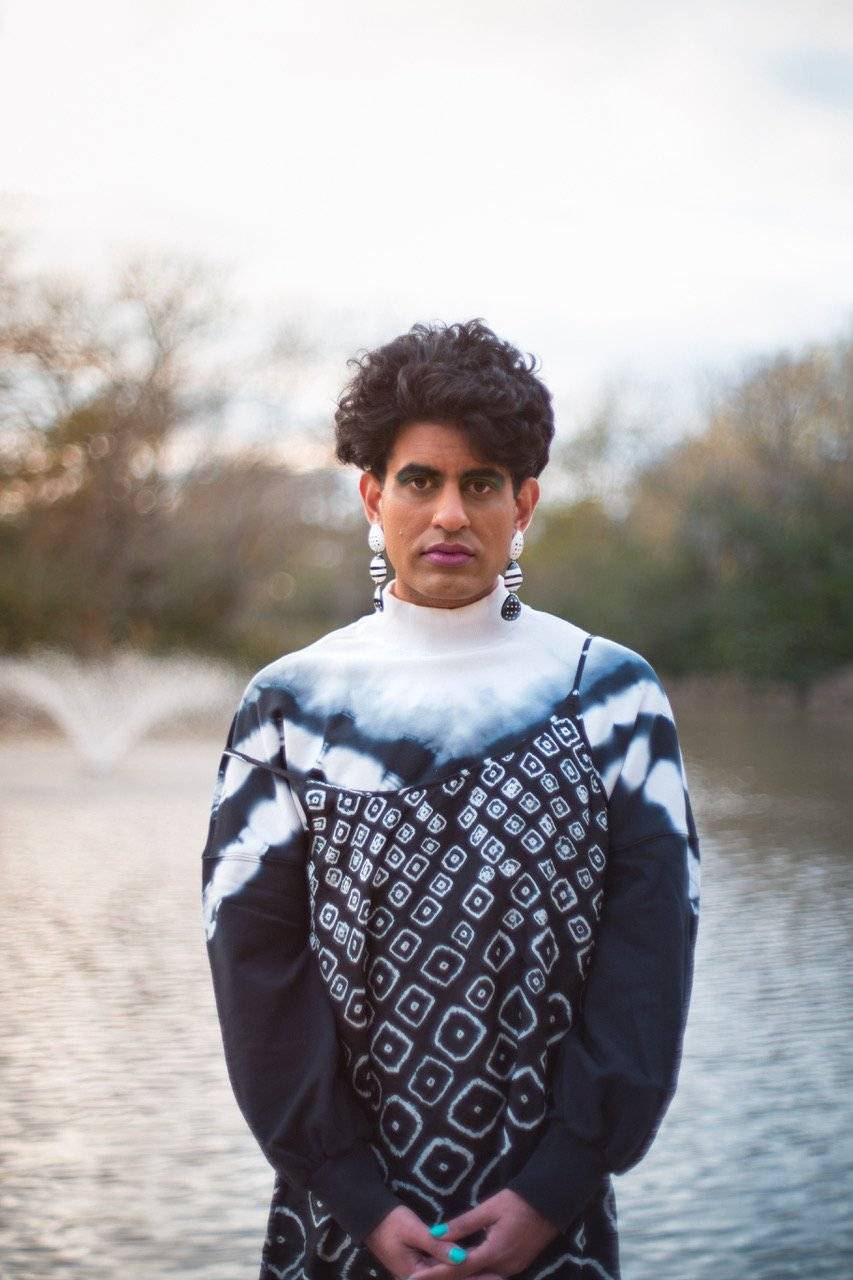
10
There’s a Lana Del Ray song, “hope is a dangerous thing for a woman like me to have – but i have it.” She ends the track repeating “but i have it, i have it.”
I am most certainly not a woman like Lana. Still, I find myself mouthing along with the same sense of defiance (and desperation). We are the most perverse choir together. We who choose hope -- and in turn -- heartbreak.
We don’t go swimming in lightning storms. We don’t drive headfirst into traffic. Why do we love when it destroys us? It doesn’t makes sense. But I’d wager most of the things that make life worth living don’t. I’d stake my life on it. In fact: I have.
I thought I knew heartache from past lovers. And then I had a doctor tell me that he could help. There are so many words out there about piecing yourself together after a romantic breakup, but what about a medical one? Being alive is a medical disaster.
There’s a discussion among those of us with chronic pain about whether we should accept we will never find relief and those who believe we should never stop trying. What I mean is often the debate happens in our own heads. And that we hold both beliefs at the same time. Am I being cynical or am I being realistic? Am I being hopeful or am I being naïve?
I think it’s all of the above.
I go from blaming god for making me suffer, to thanking them for choosing me for this journey. From looking at photos of kintsugi the Japanese art of repairing broken pottery by filling the cracks with gold to deleting all the files on my computer with research on new treatments. On the phone with the insurance company I convince myself both that I want to give up and that I want to survive as the ultimate revenge.
Writer Rebecca Solnit says that she chooses hope precisely because she doesn’t know what the future holds. Optimism and pessimism both require a prescription of what will be. But the thing about life is it’s spontaneous. Prone to combustion. So hope is about the cultivation if ambivalence, a surrender to the infinite unknowability of the universe.
Here are the things that I know: I am in pain.
Here is what I don’t.
(Can’t you see, here is what I don’t?)
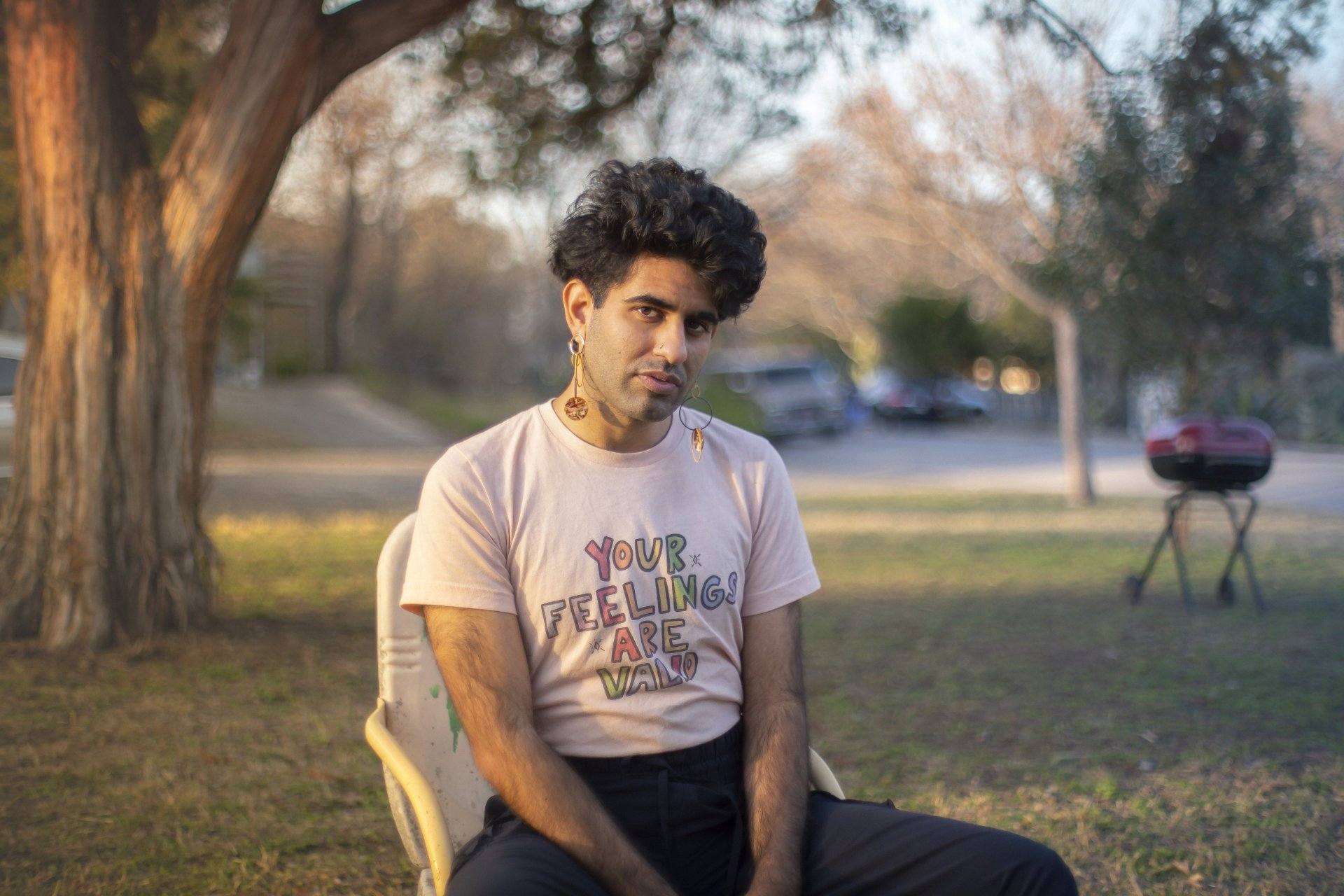
11
We categorize English words into nine parts of speech. Many words can be more than one. “Present” can be both a noun and a verb. “But” can be a conjunction and a preposition. “I” can be a pronoun, an apology, a threat. Being trans means existing in the underbelly of language. The premise of speech is the promise of it. But what about those of us for whom there are no words? It’s not that we don’t exist, it’s that we have been written out of language.
Pronouns, then, aren’t just about the ability to use a word like “she.” They are ultimately about our ability to be. This has never just been about who gets to speak. This has always been about who gets to live.
This year alone there have been over one hundred pieces of anti-trans legislation in the US. I spent some time reviewing the bills. Watching the arguments. Reading the news. What quickly becomes evident is the struggle over pronouns isn’t about diction, it’s about dehumanization.
A pronoun is a word we use to stand-in for a noun. A noun is a thing. Something that emphatically and unequivocally exists. We are not allowed to exist.
They use their adjectives to deny us our pronouns because they do not believe we are nouns. To them we are verbs. They call us [dangerous], because we are [distracting], [deceiving], [destroying]. These are not merely things we do, these are things we are. Always doing, never being.
I sat there watching them use me as a proxy to have conversations about themselves. Increasingly…sorry I? am suddenly finding it difficult to use my? pronouns.
Over time…this person writing to you now could no longer see…[its]…hands in front of…[this hairy animal in a dress]. It’s almost as if…[this degenerate creature]…began to unravel in front of…[myofascia, neurons, ligaments]. [This nuisance], [this delinquent] [this freak] tried to call for help but there were no words to be found. Just inchoate noise. The static peach fuzz frequency between radio stations. Never forget: things are not only spoken into existence. They also spoken into extinction.
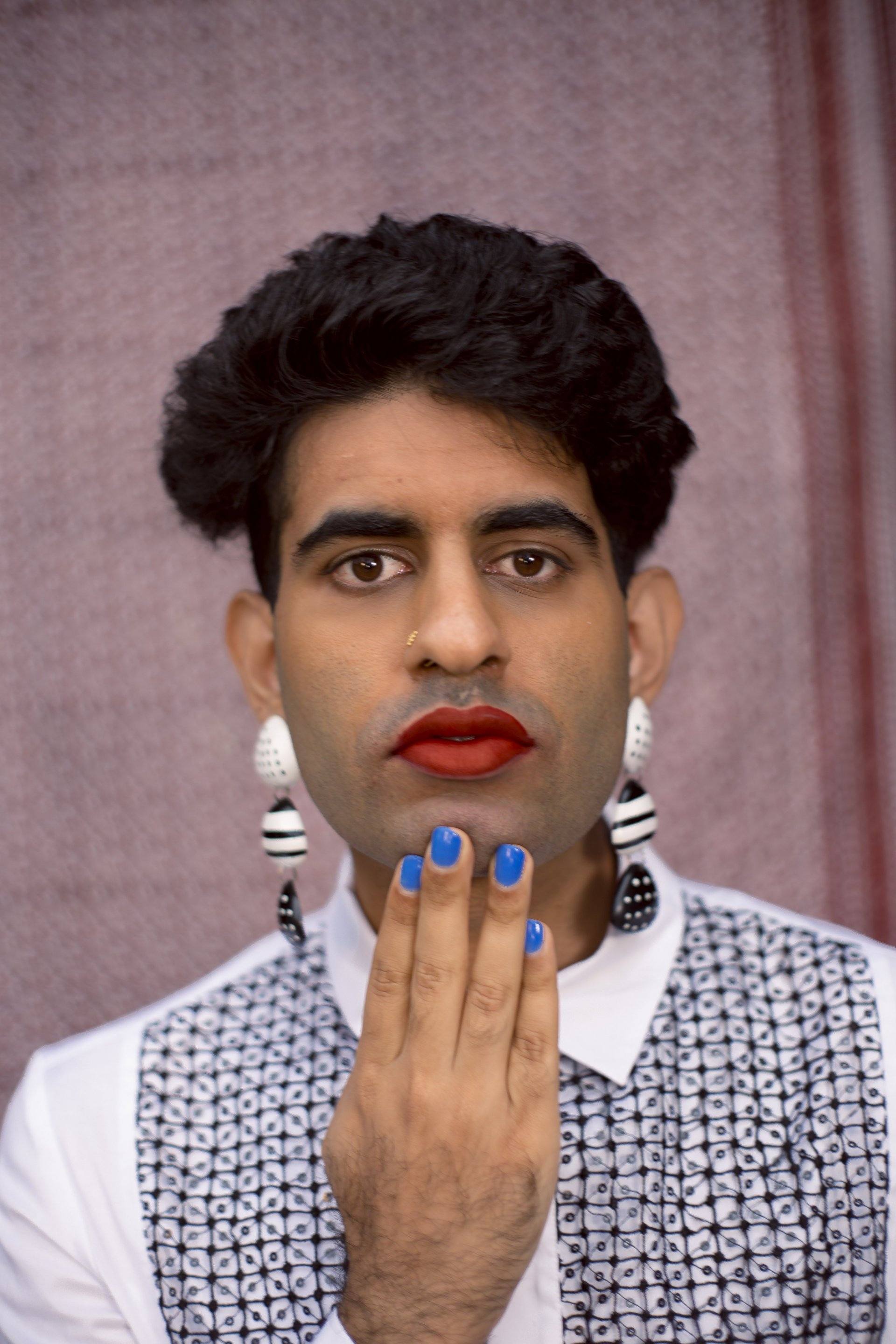
12
German psychologist Max Rubner was curious about the relationship between how we live and how we die. He calculated the lifetime number of heartbeats across species and concluded that every body only has a finite amount of life in it. There are only so many breaths before life gets depleted and we die. In other words: living is an elaborate and prolonged form of dying.
Rubner’s work inspired scientists to determine that environmental stress wears out our bodily systems prematurely. Prolonged exposure to stress can kill brain neurons. PTSD can physically re-shape our brains. Racial discrimination shortens telomers, leading to premature biological aging.
More than a century later I find myself wondering the same thing as Rubner: How much can a body take? One of us built a calorimeter to answer this question. The other: a poem. Both, imperfect tools of measurement.
I write with the curiosity and vigilance of a scientist. Being alive is both the hypothesis and the experiment. Our bodies are the evidence.
Dr. Nadine Burke Harris argues that exposure to trauma – especially in childhood – increases risk of 7/10 of the leading causes of death in the US. She believes that this research should be considered one of the most significant developments in medicine since germ theory.
Why isn’t it?
Here’s my diagnosis. To acknowledge this: the corporeality of feeling. The physicality of psychology. Would mean the end of medicine as we know it.
They would no longer be able to blame us for our deaths.
In Western medicine there’s a distinction between the body and the mind. In our lives, there is not. Feelings are biological facts. I could sit here and do nothing but think. And my body will secrete hormones, my blood flow will shift, my muscles will clench. Over time my body’s stress response might become more destructive than the stress itself and fire a pain sequence. Everything in me will notice. Will you?
Every day I read the death count. They say it was an epidemic. (I wonder which one).
